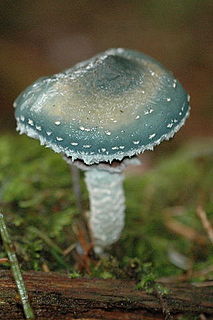
The Russulales are an order of the Agaricomycetes,. According to the Dictionary of the Fungi, the order consists of 12 families, 80 genera, and 1767 species. According to Species Fungorum, the order contains 13 families, 117 genera, and 3,060 species.

The Strophariaceae are a family of fungi in the order Agaricales. Under an older classification, the family covered 18 genera and 1316 species. The species of Strophariaceae have red-brown to dark brown spore prints, while the spores themselves are smooth and have an apical germ pore. These agarics are also characterized by having a cutis-type pileipellis. Ecologically, all species in this group are saprotrophs, growing on various kinds of decaying organic matter. The family was circumscribed in 1946 by mycologists Rolf Singer and Alexander H. Smith.

The Marasmiaceae are a family of basidiomycete fungi which have white spores. They mostly have tough stems and the capability of shrivelling up during a dry period and later recovering. The widely consumed edible fungus Lentinula edodes, the shiitake mushroom, is a member of this family. According to a 2008 estimate, the family contains 54 genera and 1590 species.

The Suillaceae are a family of fungi in the order Boletales, containing the boletus-like Suillus, the small truffle-like Truncocolumella, as well as the monotypic genus Psiloboletinus. As of 2008, there are 54 species in the family. Gastrosuillus, once considered a distinct genus, has been shown with molecular analysis to be a recent evolutionary derivative of Suillus. Fuscoboletinus, described by Pomerleau and Smith in 1962, has also been subsumed into Suillus.

The Physalacriaceae are a family of fungi in the order Agaricales. Species in the family have a widespread distribution, ranging from the Arctic, (Rhizomarasmius), to the tropics, e.g. Gloiocephala, and from marine sites (Mycaureola) and fresh waters (Gloiocephala) to semiarid forests (Xerula).

The Cunninghamellaceae are a family of fungi in the order Mucorales.
Cokeromyces recurvatus is a pathogenic fungus. Described as a new species in 1950, it was isolated from rabbit dung collected in Illinois.

Mucoromycotina is a subphylum of uncertain placement in Fungi. It was considered part of the phylum Zygomycota, but recent phylogenetic studies have shown that it was polyphyletic and thus split into several groups, it is now thought to be a paraphyletic grouping. Mucoromycotina is currently composed of 3 orders, 61 genera, and 325 species. Some common characteristics seen throughout the species include: development of coenocytic mycelium, saprotrophic lifestyles, and filamentous.

Tomentella is a genus of corticioid fungi in the family Thelephoraceae. The genus is ectomycorrhizal, and widespread, with about 80 species according to a 2008 estimate, although many new species have since been described. Tomentella was circumscribed by French mycologist Narcisse Théophile Patouillard in 1887.

Otidea is a genus of fungi in the family Pyronemataceae. The genus is widely distributed in northern temperate regions.

Utharomyces is a fungal genus in the Pilobolaceae family. The genus is monotypic, containing the single coprophilous (dung-loving) species Utharomyces epallocaulus, which is widely distributed in subtropical regions. Utharomyces was circumscribed by the Dutch botanist Karel Bernard Boedijn in 1958. U. epallocaulus has been collected in Bahamas, Ghana, India, Indonesia, Mexico, China, and the United States.
The Sigmoideomycetaceae are a family of fungi in the Zoopagales order. The family contain contains three genera, and six species. The family was circumscribed in 1992.
Gamsiella is a fungal genus in the Mortierellaceae family of the Zygomycota. The genus is monotypic, containing the single species Gamsiella multidivaricata, found in the United States.

Lobosporangium is a fungal genus in the Mortierellaceae family of the Zygomycota. The genus is monotypic, containing the single species Lobosporangium transversale, found in the USA and Mexico.
Ellen Aline Fenner was an American botanist and mycologist known for first describing the genus Mycotypha. The standard author abbreviation Fenner is used to indicate this person as the author when citing a botanical name.
Syzygites is a monotypic genus in Zygomycota. The sole described species is Syzygites megalocarpus, which was the first fungus for which sex was reported and the main homothallic representative in the research that allowed for the classification of fungi as homothallic or heterothallic. It is also the fungus from which the term "zygospore" was coined.
Mycotypha microspora is a species of fungus in the order Mucorales. It was described by Ellen Aline Fenner in 1932.










